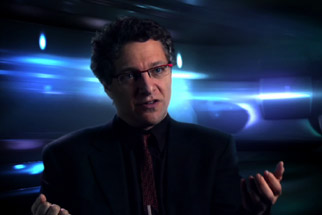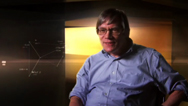Peter Galison on Time
- By David Levin
- Posted 11.10.11
- NOVA
 Listen
Listen
Physicist Peter Galison says that humans sense time as moving constantly forward, but it doesn't really work that way.
Transcript
PETER GALISON ON TIME
Posted November 10, 2011
In a way physics has departed from our everyday understanding of what time is. For us nothing is more important than the finitude of time, than the fact that we're mortal. We don't see time as reversible. We get older, we die, we see things break, we see glasses fall off of counters and shatter into pieces on the floor. We don't see these gather up and become a perfectly formed glass on the shelf again. We don't see people getting younger. We see trees grow and crack and die. We see a direction to the movement of things, and that directionality—that flow towards our own personal ends—is very different from what physics takes time to be.
There are some rare processes in physics that can occur in one direction but not in the other. But for most of physics it can go both ways, and we think of time insofar as we're thinking as physicists, as processes that are governed by a clock, by repetitive phenomena, by something that occurs over and over again. In the early days it might be the rise of the sun, the turning of the Earth on its axis, or the rotation of the Earth around the sun. We're always looking for things that repeat over and over again, and that repetition, that cycle of things, forms a relative way of understanding the advance of time. That's all time becomes is some repetitive process.
It's very different from the everyday human experience, and so time as measured by clocks, by these back-and-forth or up-and-down motions, these cyclical processes, comes to be what time is in a sense. It's the measure of things in physics, and time as a measured quantity becomes the central aspect of what time is as opposed to something purely metaphysical, something beyond anything that we could possibly measure.
Credits
AUDIO
- Produced by
- David Levin
- Original interview by
- Randy MacLowery
IMAGE
- (Peter Galison)
- © WGBH Educational Foundation 2011
Major funding for "The Fabric of the Cosmos" is provided by the National Science Foundation and the Alfred P. Sloan Foundation.
Additional funding for this program is provided by the Arthur Vining Davis Foundations.
Related Links
-

The Fabric of the Cosmos
Acclaimed physicist Brian Greene reveals a mind-boggling reality beneath the surface of our everyday world.
-

Max Tegmark on Time
Physicist Max Tegmark says that time is still one of the biggest mysteries in physics.
-

Alan Guth on Space
Physicist Alan Guth says that the concept of "space" is more complicated than you might think.
-

A Trip Through Spacetime
Join Albert Einstein on a high-speed cab ride to see why space and time are truly in the eye of the beholder.
You need the Flash Player plug-in to view this content.

